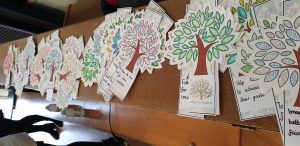Competence development Vol. 1: Identifying opportunities for social and collective value creation

Drawings of Willow Tree Academy students reflecting upon the 14 SI competences
During the 2018-2019 academic year, 8 schools from 5 European countries involving 56 teachers, 1030 students and 80 external stakeholders, experimented with different methodologies for embedding Social Innovation Education in their contexts. The impact of these efforts towards the cultivation and progression of students’ social innovation competences has been outstanding. The 14 SI competences have been evaluated in terms of progress achieved looking upon a rich mix of sources of evidence. Research findings showed a positive progression in almost all of them leaving, however, space for some adaptations and refinements.
This positive progression is mainly attributed to the model’s three core principles:
1) the student-centred approach to learning, rendering students active and self-determined producers of their own learning,
2) the co-creation process that fosters intergenerational interactions and collaborative problem solving, empowering thus students by making their voices heard and valued and also,
3) the transformative social action whereby through their projects, students are able to witness the impact they are bringing about behind little actions that can help the world further.
This is one of the three blog series that are looking into the evaluation results of the first piloting period in terms of competence development. In this volume we are tapping into the first of the three main SI competence categories, i.e. those which are important for identifying opportunities for social and collective value creation.
 Evaluation insights have shown that students have evolved from a position of ignorance to a position of interest and positive consideration towards the activities they were involved in and the ideas they were discussing. As such, they think that their learning makes a difference to their community and the wider world (vision for a better world). As the project and their activities evolved, students were able to envisage a better world by focussing on aspects they find unpleasant. Many students seemed to find it easier to think about ‘big’ problems such as world hunger, but they did not immediately view ‘smaller,’ more local issues as a problem that needs solving. Whenever the engagement of external stakeholders was constant and meaningful to them, students felt more motivated and highly inspired and were bursting with ideas about how to make the world a better place by simply following their examples.
Evaluation insights have shown that students have evolved from a position of ignorance to a position of interest and positive consideration towards the activities they were involved in and the ideas they were discussing. As such, they think that their learning makes a difference to their community and the wider world (vision for a better world). As the project and their activities evolved, students were able to envisage a better world by focussing on aspects they find unpleasant. Many students seemed to find it easier to think about ‘big’ problems such as world hunger, but they did not immediately view ‘smaller,’ more local issues as a problem that needs solving. Whenever the engagement of external stakeholders was constant and meaningful to them, students felt more motivated and highly inspired and were bursting with ideas about how to make the world a better place by simply following their examples.
“Mr Alexandros made us imagine our society a whole lot different. With his inspiration and motivation, we came up with so many ideas that we felt we could provide solutions to many social problems in our community” (pupil, 1st Experimental School of Thessaloniki).
Students were able to see the good and bad things around them and come up with ideas and ways  to improve them. However, the level of evaluating those ideas and responsibly acting towards accomplishing their goal was not that evident (responsible and critical thinking). This was expected given the different and, sometimes, challenging subjects that each of the schools and classes have been working on. Nevertheless, students have gained an increased sense of belonging and ownership. The fact that they are raising their voice and they have been heard making at the same time decisions of their own is of great value to them and make them more responsible and critical towards the subject they are focusing on.
to improve them. However, the level of evaluating those ideas and responsibly acting towards accomplishing their goal was not that evident (responsible and critical thinking). This was expected given the different and, sometimes, challenging subjects that each of the schools and classes have been working on. Nevertheless, students have gained an increased sense of belonging and ownership. The fact that they are raising their voice and they have been heard making at the same time decisions of their own is of great value to them and make them more responsible and critical towards the subject they are focusing on.
“Right now, children feel much more responsible because they are the ones that create the programme and they have understood that. So this makes them directly more responsible. And gives them more social sensitivity. I think it is a very good preparation at least starting from elementary school” (teacher, 6th Intercultural School of Kordelio)
On another note, empathy has proven to be the backbone of the project’s model and the starting point of all activities. The possibility of participating, collaborating and helping others has favored the development of empathy in students. It has been observed that without empathy, without being able to put someone’s self into the shoes of another person and sympathise or even understand and respond to their feelings, other competences could not be developed.
Drawing upon students’, teachers’ and parents’ reflections, the cultivation of this competence has also been dependent upon different things, such as the activities that students have undergone, the age of students, their interaction and hands on experience and research with the subject of their project, etc.
“The inspiration and sense of responsibility that all students have shown provided the strength and impetus our project needed. NEMESIS helped us realise how me as an individual, we as a team and everyone else are equals and that we must show respect and empathy to everyone and not only to those in need” (pupil, 1st Experimental School of Thessaloniki)
Finally, having the ability to believe in oneself, identify and assess strengths and weaknesses without undervaluing the opinions of others is of the essence in NEMESIS and is what drives people into building their confidence towards effecting positive social change (self-efficacy).
It was evident through the observations and focus groups that when telling what NEMESIS has given them, children explained that the project has favored their autonomy and their self-confidence and that this enabled them to positively use it for their benefit. They felt they could identify their strengths and weaknesses and use that positively for their project as further explained through students’ narratives.
“(…) you feel like they trust you, it’s a beautiful feeling” (pupil, CEIP Los Albares)
“Before NEMESIS we spotted things that could be improved but we didn´t know how… after NEMESIS, we became better persons, we achieve more things and we are more imaginative…” (pupil, AE Maia)
They feel that they are treated as people and not as children but as equals. A student from  AEMAIA (Portugal) has referred to her own experience, asserting that at first, she was unsure about her role but then her confidence and self-efficacy was building gradually. She was really surprised because initially she expected teachers would tell her what to do but that was not the case.
AEMAIA (Portugal) has referred to her own experience, asserting that at first, she was unsure about her role but then her confidence and self-efficacy was building gradually. She was really surprised because initially she expected teachers would tell her what to do but that was not the case.
“(…) they did not treat us like some girls who had an idea but instead as if we were two people who wanted to bring a project to school” (pupil, CEIP Los Albares)
The discussions we had with students, teachers, parents and external stakeholders made us realise that sometimes the development of some competences go hand in hand with the subjects that the different schools are involved in and working on and also the focus of each school curriculum as was the case with the Rockingham Junior and Infant School who have shown a positive progression towards ‘collective and creative problem solving’ as this was one of the six learning skills of the school. There are also occasions whereby competences need to be looked and developed in combination as was the case of the 1st Experimental School of Thessaloniki who was working on facilitating the lives of the blind in their neighborhood. Given that the subject they have chosen includes a quite special group of individuals, students had to work on developing a lot in empathy competence. However, we have witnessed that this competence would not have been cultivated and progressed if teachers had not also focused on making them responsible and critical thinkers. There are thus competences that cannot be developed in isolation and this is something that we will be looking into during the second piloting period.
“What matters is the combination and focus on a set of competences that are mutually needed in a given situation” (teacher, 6th Intercultural School of Kordelio)
…to be continued



